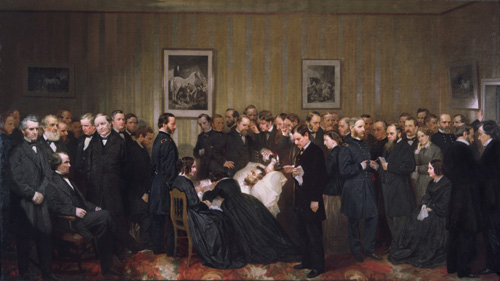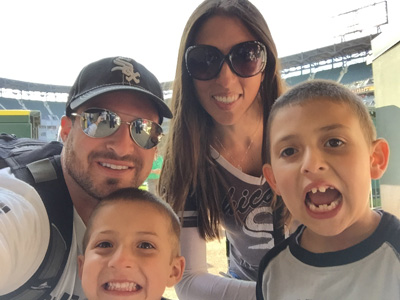Double Chai Check-In: Laurie Grauer is building Chicago ‘A Wider Bridge’
Permanent linkBeyond the Emancipation Proclamation
Permanent link
In Alonzon Chappel's 1967 painting, Charles Lieberman is one of the bearded physicians staring down to the left of Lincoln on his deathbed. (Courtesy of the Chicago History Museum)
At a time when America's heroes are dwindling, filmmakers, and historians have turned to Illinois's own Abraham Lincoln for inspiration.
Our 16th President inspired Lincoln, Steven Spielberg's 2012 film examining how his political acumen helped him get Congress to pass the 13th Amendment. Abraham Lincoln: Vampire Hunter imagines "The Great Emancipator" as a slayer of slaveholding Southern vampires.
But Lincoln's relationship with Jews, a lesser-known story, is the inspiration for a groundbreaking exhibit, "With Firmness in the Right: Lincoln and the Jews," that opens Monday, Aug. 3 at the Abraham Lincoln Presidential Library and Museum in Springfield, Ill. Based on the book Lincoln and the Jews: A History, by Jonathan D. Sarna and Benjamin Shapell, the exhibit opened at the New York Historical Society earlier this year.
"This is not the stories you've heard about Lincoln from textbooks. It opens up a whole new world of another aspect of Lincoln's life," said Carla Knorowski, CEO of the Abraham Lincoln Presidential Library Foundation.
Considering that Lincoln grew up at a time of anti-Semitism, many people may be surprised to learn that he was deeply committed to religious pluralism and had more Jewish friends and acquaintances than any president before him. In 1809, the year of Lincoln's birth, scarcely 3,000 Jews lived in America. By 1865, the year of Lincoln's assassination, that number had increased to 150,000.
.jpg)
Abraham Jonas is a Jewish lawyer from Quincy who is instrumental in Lincoln's political rise. (Courtesy of the Wells Family Collection)
The exhibit includes a series of letters between Lincoln and Abraham Jonas, a Jewish lawyer from Quincy, Ill., who is instrumental in Lincoln's political rise. In a friendship that spans just over two decades, Jonas is one of the first to support Lincoln's candidacy for president and urged the Republican Party to woo political outsiders like the "liberal and freethinking Germans" and "Israelites."
In 1861, Lincoln rewards Jonas' contributions with the plum political appointment of Postmaster of Quincy. But perhaps the greatest testament to their friendship is Lincoln's handwritten order in May 1864 to allow one of Jonas's sons, Charles, then a Confederate POW, "a parole of three weeks to visit his dying father."
Lincoln's fundamental sense of fairness distinguished him throughout his political career. Evidence of this trait appears in many of the documents, photographs, letters, Bibles, and other artifacts assembled for the Springfield exhibit. The items are drawn from a variety of sources including the Shapell Manuscript Foundation, the Chicago Historical Society, Brown University, and the Library of Congress, and some of them are being displayed publicly for the first time.
.jpg)
During the Battle of Vicksburg, Lt. Ephraim M. Joel of St. Louis seized Confederate cannons. With this March 1, 1864 order, Lincoln promoted him Quartermaster with the rank of Captain. (About 50 Jews were appointed quartermasters, but solely on basis of their merit and connections.) (Shapell Manuscript Collection)
The Springfield exhibits includes a tracing of Lincoln's own feet and highlights Lincoln's close relationship with his eccentric foot doctor, the British-born Dr. Issachar Zacharie who is buried in London's Highgate Cemetery. In 1863, The New York World reported that the doctor "enjoyed Mr. Lincoln's confidence more than any other private individual."
.jpg)
Issachar Zacharie was not your average foot doctor; he was also Lincoln's personal spy and emissary. In September 1863, Zacharie met with Benjamin P. Judah, the Confederacy's Jewish Secretary of State, to propose peace negotiations. (The Shapell Manuscript Collection)
The president even sent Zacharie on peace and intelligence missions to the South during the war. Lincoln had just appointed General Banks to replace an anti-Semitic Benjamin F. Butler in the Gulf. With Jewish connections in New Orleans, Zacharie was the ideal choice to help repair relations with its 2,000 Jews. Lincoln urged Banks to make somewhat mysterious use of Zacharie's skills: "I think he might be of service to you, first in his peculiar profession, and, secondly, as a means of access to his countrymen, who are quite numerous in some of the localities you will probably visit."
Lincoln made bold decisions that transformed Jews from outsiders to insiders in American society. One significant example is Lincoln's overturning of Ulysses Grant's General Orders No. 11 (December 1862) that expelled Jews "as a class" from Union-controlled territory (this included parts of southern Illinois, Tennessee, Kentucky, and Mississippi). Born out of frustration with some Jewish cotton smugglers, Grant's edict qualified as "the most blatant state-sanctioned act of anti-Semitism in American history," according to Lincoln and the Jews.
Daniel Stowell, the Lincoln Presidential Library's curator for the exhibit, agrees that Lincoln's countermand of Grant's order shows how Lincoln stood up to anti-Semitic generals. "Lincoln gave wide latitude to Generals that were succeeding and Grant was one of them," Stowell notes. "Lincoln would have had no trouble if Grant said, 'Okay, all peddlers need to leave the area,' but Lincoln was quoted as saying he did not like condemning a whole group because of a few sinners."
In September 1862, Lincoln took another bold action, appointing Rabbi Jacob Frankel of Philadelphia as the U.S. military's first Jewish chaplain, and that document is included in the Springfield exhibit. At that time, there were 7,000 Jews in the Union Army.
"Many Jews did feel like second-class citizens, especially in the decades prior to the Civil War, but Lincoln establishes this sense that all sorts of people should be treated as equals. The Emancipation Proclamation was all about that idea," he said.
Regarding renewed interest in Lincoln -- the man and the politician-Sarna speculates that, at a time when many Americans are disaffected by the political process, Lincoln's mastery of politics left a lasting impression. "There may be a certain nostalgia toward a president who was Honest Abe. It's really extraordinary when you see the extent to which he was able to live his values and accomplish so many things," he said.
In the days after Lincoln's assassination, rabbis compared the anti-slavery president to the greatest of biblical heroes from the patriarch Abraham to the prophet Moses. When some of our heroes today have disappointed us, it's comforting to know we still have Lincoln.
Jennifer Brody is a former associate editor at JUF News and a freelance writer living in Chicago.
Double Chai Check-In: Asha Goldstein continues pursuing tikkun olam
Permanent link
Asha and family at a White Sox game
Asha Goldstein's decision to convert to Judaism was not about her. Although becoming a Jew by choice in 2008 played a big role in developing her identity as a Jewish woman, Goldstein's embrace of Judaism was more about adopting a set of values that emphasizes helping others, and bringing her family closer.
"It was almost a family affair," Goldstein said. "We were all participants throughout the process. And then I went through the mikvah and that felt like a new chapter, a new beginning."
These last seven years, she has cultivated a strong foundation rooted in living those Jewish values daily, both personally and professionally, taking every opportunity for tikkun olam and building community.
Since being named to Oy!Chicago and YLD's Double Chai in the Chi 36 under 36 list in 2014, Goldstein has taken a more active role in her synagogue, B'nai Tikvah in Deerfield, recently becoming a trustee on the synagogue board. She said she hopes to learn and grow from the experience and that her involvement will allow new members to feel welcome.
"Hopefully I will be able to engage more people, get more congregants to our synagogue and share the positive experiences I've had," she said. "Hopefully that will resonate with others."
Goldstein also devotes herself to uniting Jewish people throughout Chicago and the world, including through JUF. She recently participated in a JUF Phonothon, which she said allowed her see the true impact of the JUF's work on the Jewish community.
Some of the individuals shared with her how JUF's services helped change their lives. She said that despite their financial struggles, "they still wanted to make some kind of contribution to the JUF campaign because of the impact that JUF made on their life previously."
Lessons learned about helping others and being a caring individual are something Goldstein is also devoted to passing down to her children. She explains one such lesson through the concept of lighting the candles on Jewish holidays.
"We light all the candles from just one candle, which demonstrates the lesson that you can help others and that doesn't take anything away from you," she said. "You can light other candles without taking anything away from your own."

Asha and family on vacation
Beyond her family, Goldstein practices helping others through her work as a managing principal at Cedar Wealth Management, which educates and counsels individuals, including women and others going through divorce, on financial matters.
Goldstein's office will relocate from downtown Chicago to Rosemont, a move she predicts will allow her to reach new clients, while still allowing her to continue assisting those in the city.
Above all else, Goldstein said she enjoys that her job provides her with yet another opportunity to give back to all kinds of people.
"The most rewarding part of my job is helping people at all levels," she said. "Even though we mostly deal with affluent families, all levels need guidance."
To meet the honorees of the 2015 Double Chai in the Chi, Chicago's Jewish 36 Under 36 List, register YLD's WYLD party at 7 p.m. Thursday, Aug. 13 at John Barleycorn in River North, 149 W. Kinzie St.



.jpg)



